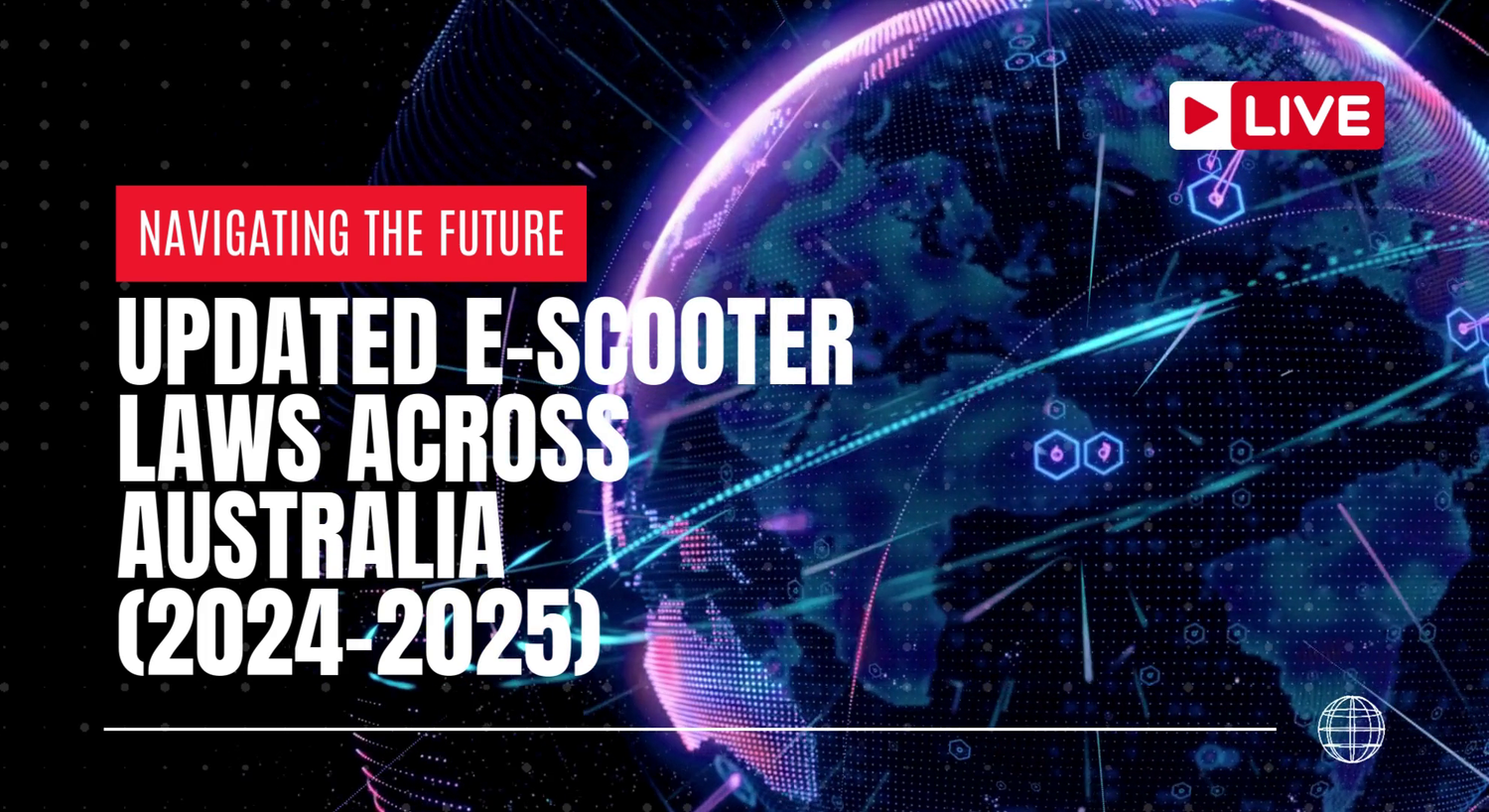As e-scooters continue to gain traction as a popular mode of urban transport in Australia, state governments are actively revising their regulations to enhance safety and accessibility. This blog provides an in-depth look at the current and upcoming laws for e-scooters across each state, organized by stages of implementation for 2024-2025. Understanding these changes is crucial for riders, manufacturers, and local councils as they navigate this evolving landscape.
New South Wales (NSW)
Current Status
- Legal Use: In NSW, e-scooters must comply with specific safety standards. E-scooters that exceed 250 watts or can reach speeds over 25 km/h are classified as motorcycles, necessitating a license, registration, and insurance.
- Trial Programs: Various local councils have initiated trials for shared e-scooter schemes. These trials aim to assess the impact of e-scooter use on public safety and traffic patterns.
Future Developments
- Stage 1 (February 2025): A new regulatory framework will begin rolling out, focusing on compliance with safety standards for both e-scooters and e-bikes. This includes mandatory testing and certification requirements for manufacturers and sellers 1.
- Stage 2 (August 2025): By this date, all e-scooters sold in NSW must meet the newly established safety standards. This will ensure that only compliant models are available to consumers.
- Stage 3 (February 2026): Full implementation of the updated regulations will take effect, marking a significant shift towards standardized safety practices across the state.
Implications
These changes aim to strike a balance between promoting the use of e-scooters as a sustainable transport option while ensuring rider safety and public acceptance. As these regulations unfold, it will be essential for riders to stay informed about compliance requirements.
Victoria
Current Status
- Legal Use: In Victoria, e-scooters are permitted on shared paths and roads with a maximum speed limit of 20 km/h. Riders must be at least 16 years old and are required to wear helmets.
- Trial Programs: The City of Melbourne's shared e-scooter scheme concluded on September 24, 2024. However, broader trials across other municipalities are ongoing until October 6, 2024 2.
Future Developments
- Stage 1 (October 2024): The government will evaluate the outcomes of the ongoing trials to inform future regulations. This evaluation will consider factors such as rider safety, compliance rates, and public feedback.
- Stage 2 (Late 2024 - Early 2025): Based on trial results, new laws may be implemented that could include adjustments to speed limits, age requirements, or designated riding areas.
Implications
The outcome of these evaluations could lead to more permanent regulations that reflect the needs and concerns of both riders and pedestrians. It’s crucial for stakeholders to engage in this process to ensure that their voices are heard.
South Australia
Current Status
- Legal Use: Currently, South Australia allows only fleet-operated e-scooters under specific permits. Private e-scooters remain illegal on public roads or paths 3. Recent proposals have been met with concern regarding accountability in case of accidents 4.
Future Developments
- Stage 1 (Mid-2024): Legislation is expected to be introduced that would legalize private e-scooter use. This marks a significant step towards integrating personal mobility devices into everyday transport options.
- Stage 2 (Early 2025): The new laws will outline usage conditions, including speed limits (likely around 15 km/h) and designated areas for operation.
Implications
The introduction of private e-scooter use could significantly impact urban mobility in South Australia. It is essential for local councils to prepare infrastructure that accommodates these vehicles safely.
Queensland
Current Status
- Legal Use: E-scooters can be used legally on footpaths and shared paths with a maximum speed limit of 25 km/h. Riders must be at least 12 years old and wear helmets while riding.
Future Developments
- Stage 1 (Ongoing): The Queensland government is continuously discussing potential updates to regulations based on user feedback and safety data collected from existing trials.
Implications
As Queensland evaluates its regulatory framework, there is potential for more flexible rules that encourage responsible riding while addressing safety concerns. Community engagement will be vital in shaping these regulations.
Western Australia
Current Status
- Legal Use: In Western Australia, e-scooters are allowed on shared paths but prohibited on footpaths unless local councils grant permission. Riders must adhere to specific speed limits and wear helmets.
Future Developments
- Stage 1 (Ongoing): Local councils have the authority to establish their own rules regarding e-scooter use, which may lead to a patchwork of regulations across the state.
Implications
This decentralized approach allows for tailored regulations that meet local needs but may also create confusion among riders about where they can legally operate their devices. Clear communication from councils will be essential.
Conclusion
The regulatory landscape for e-scooters in Australia is undergoing significant changes as states adapt to the increasing demand for alternative modes of transport. With staged implementations planned across various states throughout 2024 and into 2025, it is crucial for all stakeholders—including riders, manufacturers, local councils, and pedestrians—to stay informed about these evolving laws.
As cities work towards integrating e-scooters into their transport networks safely and effectively, community engagement will play a vital role in shaping future regulations. By fostering dialogue among all parties involved, Australia can create a balanced approach that promotes sustainable transport while prioritizing public safety. As we move forward into this new era of mobility, staying updated on legislative changes will ensure that everyone can enjoy the benefits of e-scooter travel responsibly.




Leave a comment
This site is protected by hCaptcha and the hCaptcha Privacy Policy and Terms of Service apply.